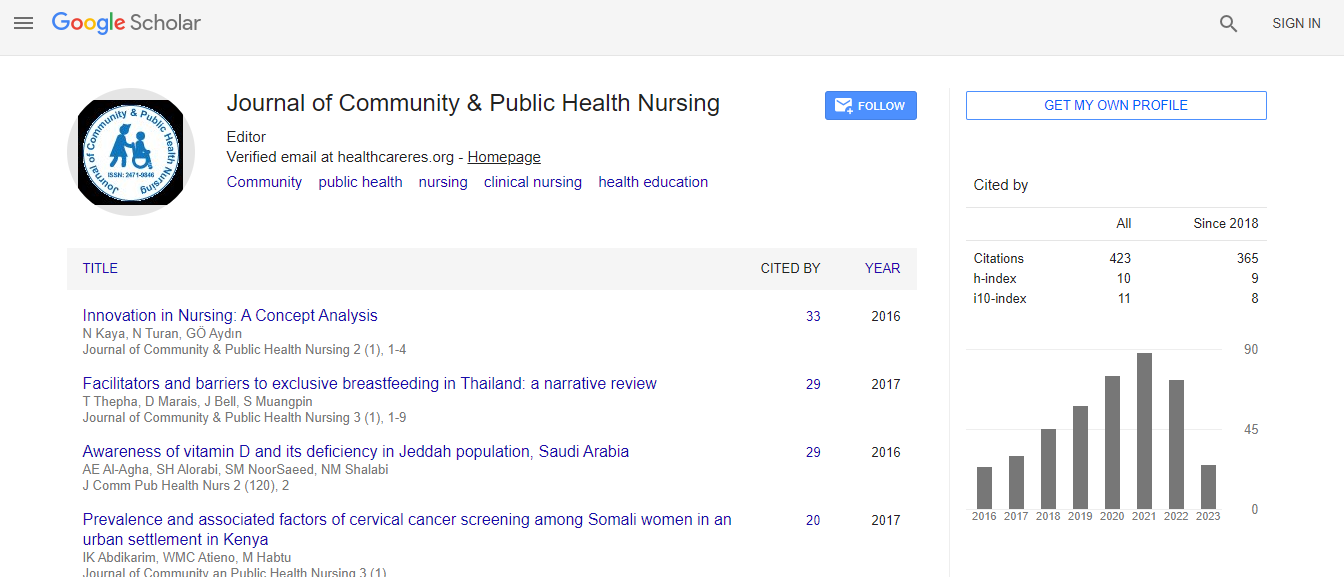Our Group organises 3000+ Global Conferenceseries Events every year across USA, Europe & Asia with support from 1000 more scientific Societies and Publishes 700+ Open Access Journals which contains over 50000 eminent personalities, reputed scientists as editorial board members.
Open Access Journals gaining more Readers and Citations
700 Journals and 15,000,000 Readers Each Journal is getting 25,000+ Readers
Google Scholar citation report
Citations : 421
Journal of Community & Public Health Nursing received 421 citations as per Google Scholar report
Journal of Community & Public Health Nursing peer review process verified at publons
Indexed In
- Google Scholar
- CiteFactor
- RefSeek
- Hamdard University
- EBSCO A-Z
- OCLC- WorldCat
- Publons
- Geneva Foundation for Medical Education and Research
- ICMJE
Useful Links
Recommended Journals
Related Subjects
Share This Page
Non-formal CNE program barriers to participation: A comparative study among hospital nurses of two provinces in Pakistan
Joint Event on 21st World Congress on Registered Nurse and Nurse Practitioner Meeting & Nursing Education and Management
Zafar Iqbal Channa
Pakistan Institute of Medical Sciences, Pakistan
Posters & Accepted Abstracts: J Comm Pub Health Nursing
Abstract
Rapid scientific and technological discoveries have increased the demands of specialized nursing care. Knowledge and skills can be restored by engaging nurses in a set amount of continuing nursing education (CNE) program activities. Literature suggested that degree or license is not the end point of education after basic nursing study. Apparently, basic nursing education for practice becomes obsolete within five to ten years of graduation. This obsolescence can lead to the poor performance of nurses in clinical practice. Therefore, the study was designed to investigate and compare barriers to participation among hospital nurses of two provinces in Pakistan. Cross-sectional descriptive study approach used to collect data through a convenience sampling technique of three hundred (n=300) nurses. “Barriers to Participation Questionnaire” (BPQ) was used as a research tool. Quantitatively, result interpretation was set as “the lower the mean score in each type of barrier, higher the barrier was measured due to reverse Likert scale rating. Generally, an administrative barrier was found higher and most prevalent barrier, the work-related barrier was more predictive and financial barriers as predicting barrier as compared to family and personal barrier. Data also revealed that Punjab nurses have greater administrative with the mean score of 2.16±0.87 and work-related barriers with the mean score of 2.43±0.81 than the nurses from Sindh province with a mean score of 2.26±0.75 and 2.81±0.90. Regarding the financial barrier, both provincial nurses have equal level barriers than the family and personal barriers among nurses of two provinces. To keep nurses connected with advanced knowledge in a rapidly changing healthcare environment, more opportunities of non-formal CNE programs should be provided for all employed nurses in all provinces.Biography
E-mail: zafariqbalchanna@gmail.com

 Spanish
Spanish  Chinese
Chinese  Russian
Russian  German
German  French
French  Japanese
Japanese  Portuguese
Portuguese  Hindi
Hindi 
